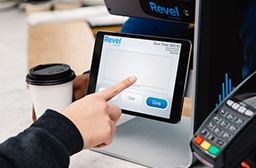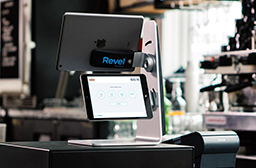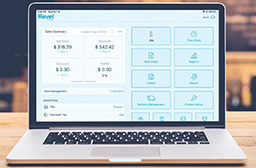Revel Systems is now part of Shift4 and this website will soon redirect to Shift4.com.
Call Sales: +1 (833) 437-3835
Guide to Developing Profitable Customer Relationships
Your customers are the lifeblood of your business. To stay competitive in the market, it is important to build customer relationships that increase customer loyalty and drive business.

The Importance of Customer Relationships
There’s no denying the importance of customer relationships. Ultimately, customer sentiment can make or break your business in the long term. It’s one thing to understand the importance of your customers and another to develop and follow an engagement strategy giving them the attention they deserve. Read through the steps in this guide to get started with a customer engagement plan of your own.
1. Set Goals and Expectations
A simple Google search about customer relationship data could put you in a frenzy. The trick is, set simple, focused, and measurable goals. Here are three goals you might want to start with:
- Since deploying customer relationship management (CRM) tools, how has customer retention been impacted?
- How much revenue are returning customers generating for your business?
- How has implementing CRM tools impacted your operational costs?
It is important to understand that the most powerful goals follow the SMART goal setting method. Your goals should be:
- Specific
- Measurable
- Attainable
- Relevant
- Time Bound
Metrics Examples:
- Number of new customers
- Number of return customers
- Overall and monthly, quarterly, etc. return customer revenue
- Average transaction size of return customers versus new customers
- Purchasing frequency of return customers
- Customer lifetime value
- Percentage of first-time customers who become repeat customers
Document your goals and move on to step two.
2. Identify Customers
CRM gives an average of $8.71 for every $1 spent.
Existing Businesses
Brand loyalty is more competitive than ever. So, it is important to increase lifetime customer value within your already loyal customers. Do you have customers who used to be regulars then disappeared? Re-engage with your inactive customers and remind them why they love your brand.
An important target is customers who have purchased once from your business. Be sure to capture their information at the point of purchase and turn a new customer into a return customer.
New Businesses
It is important to create brand ambassadors through your loyal customer base. These people will be critical in attaining new customers and widening your customer base.
3. Gathering and Segmenting Meaningful Data
Identify what customer data to capture; this data should be driven by your business goals.
KEY INFORMATION TO COLLECT:
- First and last name
- Phone number
- Zip code
- Purchase history
ADDITIONAL INFORMATION TO COLLECT:
- Birthdate
- Company name
- Shipping and billing address
- Photo
CREATING CUSTOMER GROUPS
Once you have created a customer profile with this information, you can build out larger customer groups that segment your customer base. For example, you can create a customer group based on of an age demographic, say Gen Z. You can easily offer discounts, reward programs, and personalized marketing to a whole segment of Gen Z patrons.
4. Educate Your Team
82% of consumers are spending more with companies that invested in customer experience
Train your team on your customer relationship management tools. Spend time reviewing what the tools track, how to prompt the tools, and how to read and understand the data. Be sure to train your team on how to personalize your offerings based off of the tracked customer data.
5. Personalized Marketing With CRM
It costs five times as much to attract a new customer than to keep an existing one
Use your CRM tools to personalize your marketing and reach customers wherever they are. One of the most valuable benefits of CRM is to build on your existing marketing strategies.
DRIVE CUSTOMER ENGAGEMENT
Create and target customer segments and then drive engagement with a well-executed email marketing program that leverages your CRM data. Automatically sync your customer data into marketing automation software, such as MailChimp, Hubspot, Constant Contact, Pardot, or others.
Don’t forget to reach your customers on mobile! This is a growing and powerful way to engage with your regulars and new visitors alike. By collecting customers’ phone numbers, you can deploy text message marketing.
Integrate CRM into your rewards program to help identify what drives your customers to spend more or make more frequent purchases. Then, set automations for all actions.
And of course, consolidate your marketing messages while fine-tuning them to reach specific segments of your existing customer base.
6.Track and Evaluate
Track the results of your business’ investment in CRM technology. Analyze the metrics set out in step one and detail the successes and where you need to remediate. Monthly and year over year evaluation is important to keep you on track to achieving your goals.
Keep track with a chart to clearly measure your goals and achieved numbers.
EXAMPLE:
| Goal | Actual – January | Actual – February | Actual – March |
| Increase repeat customers by 15% | 10% | 16% | 21% |
| Achieve $3000 in repeat customer revenue | $1700 | $2100 | $3500 |
If you are having trouble meeting your numbers, be sure that you are making the most of your CRM tool. Connect with your CRM vendor to ensure that you have optimized your customer engagement strategy across all channels and that you are collecting the necessary data to boost your bottom line.
FINAL THOUGHTS
With so much competition for your customers’ attention, it’s important to develop an understanding of who they are, what their shopping habits are, and what excites them. That’s why today’s businesses large and small should be deploying CRM.



